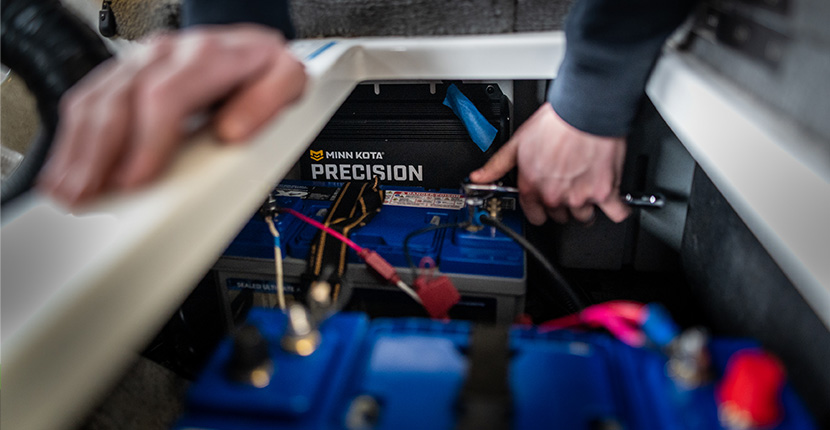Storing Your Boat Battery in the Winter
- by Joe Weber - updated on 9/13/2022

Properly storing your boat's batteries in the winter will help ensure that your boat will be ready to go when the boating season starts in the spring. Below you will learn the best methods for storing your battery to guarantee that your battery will be optimally charged when it goes back in your boat.
How to Store Boat Batteries in the Winter
One of the worst feelings for a boater when starting the boating season is getting on the water and your battery is dead. Keep our handy winter storage checklist nearby to follow when it's time to store your boat for the winter to winterize your boat batteries so they are ready for the next spring boating season.
Winter Marine Battery Storage Checklist
- Before storing your boat for the winter, charge your batteries one last time to reduce the risk of the battery freezing during cold weather.
- Disconnect the terminals from any electrical loads. Even the smallest load can damage a battery in the off-season.
- Remove the batteries from the boat and store them in a cool, dry place. A garage is an excellent example because your battery won't freeze like it would if it was stored outside.
- Store them in a place that has easy access to an outlet to charge.
- Charge your batteries monthly or keep them connected to a trickle charger.
- Use a charger that is designed for your battery type. Some chargers are designed to work with all battery types, flooded, AGM and lithium, but not all are like this. Make sure to select the right charger for your boat's batteries.
How Do I Maintain Lithium Marine Batteries in the Winter?
Unlike traditional lead-acid batteries that need to be stored at nearly full charge when in storage, lithium batteries need a little less maintenance when in the off-season. Due to their design, lithium batteries have a very low self-discharge rate, meaning they don't lose charge as fast as lead batteries and need less watching during the off-season. For lithium batteries, you should store the battery at roughly 50% charge and check it every couple of months to see if the charge has dropped below 30%. If it has, connect it to a charger and charge it back up to 50%. You can also, and it's recommended, use an automatic battery maintainer in the off-season no matter what type of battery you have.
Finding the Right Boat Battery Charger
It's critical to look at what type of battery the battery charger works with. For instance, you will want a charger that works with lithium if you have a lithium battery, flooded for flooded batteries, and so on. Many new chargers work with several battery types but never assume that they will work for all batteries.
You will also want to use a charger designed specifically for the voltage battery that you have in your boat. If you have a 12-volt battery, you will want to use a charger that is designed to be used with a 12V battery. The NOCO Genius 10 Automatic Charger is a great charger that works for both 6-volt and 12-volt batteries.
How Long Can You Leave a Marine Battery on a Trickle Charger?
Depending on the type of charger that you have, the recommendations for this may change. If you have an old charger that is not smart or automatic you will want to only have it connected to the battery for as long as it takes to bring the battery to a full charge. Leaving a standard charger connected to a battery could result in overcharging.
Using a smart, automatic charger is ideal for storing batteries long-term. Our X2Power marine chargers are completely automatic and will charge your battery up to a full charge and switch to a maintenance mode to keep the battery at the optimal level without overcharging and damaging the battery. With this type of charger, you can leave it connected for long periods without worrying about damaging the battery.
Can I Leave My Batteries in My Boat Over Winter?
While technically leaving your batteries in your boat over the winter is allowed, it is not recommended. Leaving your battery in extreme cold could lead to a cracked case or a completely drained battery if not maintained properly. Even if you do leave the battery installed in the boat you may need to make several trips to the boat for regular battery maintenance. The best option would be to follow the checklist above and remove the batteries and store them for the winter.
Where Do I Go for a New Boat Battery?
Even if you follow all of the best practices and keep your batteries charged and ready for the next boating season you could find yourself in need of a new battery. Bring your battery into your local Batteries Plus location to have it tested free of charge. If it needs replacing we carry a large selection of boat batteries from top brands like Duracell Ultra and our private brand X2Power.
To learn more about the best batteries for your boat read our blog article titled "5 Best Marine Batteries for 2023". If you need help finding the right charger for your boat take a look at our article "How to Find the Right Battery Charger for Your Boat" for tips and recommendations for a new charger.